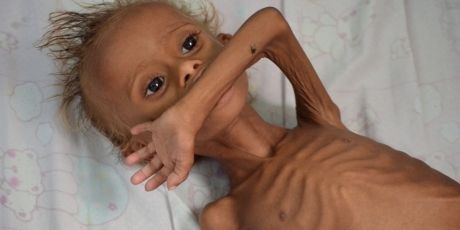- About
- Topics
- Picks
- Audio
- Story
- In-Depth
- Opinion
- News
- Donate
- Signup for our newsletterOur Editors' Best Picks.Send
Read, Debate: Engage.
| May 28, 2018 | |
|---|---|
| topic: | Political violence |
| tags: | #conflict, #humanitarian crisis, #children, #Houthi |
| located: | Yemen, Saudi Arabia, Qatar |
| by: | Bob Koigi |
The war pits the Houthi rebels, an amalgam of tribes in the northern highlands of the country that took control of the country’s capital Sanaa and removed from power a US-backed government, against a coalition that has the backing of Saudi Arabia and its Arab allies including the United Arab Emirates, Bahrain, Oman, Kuwait, and Qatar keen on neutralising Houthi’s influence.
The United States has been offering support to the Saudi led coalition including logistical support, weapons and intelligence. While the US has advanced the argument of restoring stability and order while stopping the spread of Islamist groups as its reason for involvement in the war, it has come under sharp criticism for participating in a conflict that is hurting civilians more than the fighters by violating the basic tenets of international humanitarian law. US airstrikes in Yemen are said to have notably increased in 2017, the first year of Trump’s presidency.
A report by the UN Panel of Experts on Yemen has documented serious violations of human rights law that has led to numerous civilian casualties. It highlighted the 2017 launch of ten airstrikes by the Saudi- led coalition that resulted in 157 civilian deaths and 135 injuries.
“The rule of law is deteriorating rapidly across Yemen, regardless of who controls a particular territory. The Government of Yemen, the United Arab Emirates and Houthi-Saleh forces have all engaged in arbitrary arrests and detentions, carried out enforced disappearances and committed torture. The Houthis have summarily executed individuals, detained individuals solely for political or economic reasons and systematically destroyed the homes of their perceived enemies,” the report read in part.
Caught in the crossfire are ordinary citizens, with children bearing the brunt of the war, even as the world looks away, in what is being described as the forgotten war.
According to ‘Born into War,’ a Unicef report on the situation in Yemen, the country is one of the worst places in the world to be a child. Over three million children have been born during the war, with another 5,000 killed or injured in the conflict, which translates into five children every day since the war broke out in 2015.
Another 2 million children are now out of school with malnutrition and diseases like cholera taking a toll on the young ones.
“An entire generation of children in Yemen is growing up knowing nothing but violence. Children in Yemen are suffering the devastating consequences of a war that is not of their making”, Meritxell Relano, UNICEF Representative in Yemen said in a statement. “Malnutrition and disease are rampant as basic services collapse. Those who survive are likely to carry the physical and psychological scars of conflict for the rest of their lives.”
Parties to the conflict have used food as a weapon of war. The Saudi Arabia-led coalition, afraid that the Iranian weapons might get into the country to arm the Houthi rebels, has blocked all entry points to the country. This has made it difficult for aid organisations to bring in the much-needed food and medical rations creating one of the largest man-made famines in history. Sana’a airport remains closed to commercial traffic, further complicating relief interventions. More than 8 million civilians are now a step away from famine, according to the United Nations. Such tough times have seen millions fleeing their homes in search of food and a spike in child marriages as families struggle to support their own. Close to two-thirds of girls are married before they are 18.
The country’s Prime Minister Ahmed bin Dagher has made a passionate appeal on social media to his allies to send money to the central bank to help him avert a looming famine.
And as the elusive truce and reconciliation process staggers on, exacerbating the humanitarian crisis in the Arabian Peninsula country, a change of modus operandi to factor in the political process has been fronted even as combatants continue defying any peace deal. “We need a serious political process to lead to a political solution because there was never a humanitarian solution for any humanitarian crisis. The solution has always been political and in Yemen what we need is a political solution for these pledging conferences not to be repeated in the future,” UN Chief Antonio Guterres recently said.
By copying the embed code below, you agree to adhere to our republishing guidelines.

